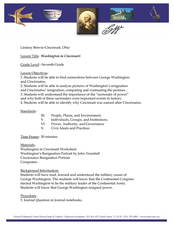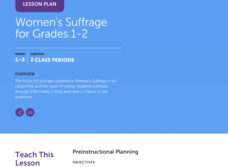Curated OER
Come Fly with Me . . . Open a Book: Travels through Literature
This detailed overview of a curriculum unit suggests using travel literature to engage and stimulate your third graders’ interest in reading. The suggested reading list includes fiction and non-fiction materials and offers urban children...
Curated OER
Mark Twain: Straddling the Civil War
Mark Twain's life, politics, writing, and role as a mirror of pre- and post-Civil War American culture are the focus 11th and 12th graders in this section from an expansive author study. A critical writing assignment comparing Twain to...
Curated OER
Look Out My Window. What Do You See?
Students explore William D. Huff's experience during Civil War as portrayed in his drawings, express empathy and demonstrate historical knowledge through creating their own artwork, and craft drawings and captions from perspectives of...
Curated OER
African American Women Before and After the Civil War: Slavery and Freedom
Students listen to data on African American women in Texas before the Civil War. In this Civil War lesson, students compare and contrast the lives of slave and free women, and discuss case studies, locating areas on a map. Students...
Curated OER
Abolitionists and Their Impact on Sectionalism
Eleventh graders examine the impact of Abolitionist leaders on sectionalism. In small groups, they conduct research on a famous abolitionist, and develop and write a newspaper cover page based on their assigned abolitionist.
Curated OER
Civil War Prison Camps
Fourth graders work with a partner to create a puppet show that demonstrates the condition of the prisoners in Andersonville, Georgia during the Civil War.
Curated OER
And the Streets Are Paved With Gold
Middle schoolers explore immigrant experience at Ellis Island, New York, at the turn of the century, and answer questions that challenge them to use thinking skills from various levels of Bloom's taxonomy.
Curated OER
Meet Hannah the Weaver
Students analyze primary and secondary sources to explore slavery and emancipation, and write letter or diary entry from point of view of slave Hannah Harris or plantation owner Robert Carter. Students then dramatize their creative...
Curated OER
Thanksgiving
First graders summarize similarities and differences of life in England and America for the Pilgrims by reading a mini-book. Then, they write a journal entry in first person on what it is like to be a pilgrim in England and in America....
Alabama Department of Archives and History
Birmingham: The Magic City
Why is Birmingham known as the magic city? A comprehensive lesson plan provides hands-on activities, group discussion, and writing exercises to teach young historians about the importance of the city of Birmingham. Scholars learn the...
What So Proudly We Hail
Life, Liberty, and the Pursuit of Happiness: A Lesson on the Declaration of Independence
What does it mean to say that a right is unalienable? How did the founding fathers convey this revolutionary concept in the Declaration of Independence? Engage in a close reading and analysis of the Declaration of Independence, and...
Crafting Freedom
F.E.W. Harper: Uplifted from the Shadows
What is stereotyping, and how do we handle stereotyping in our daily interactions? Your young historians will not only have the opportunity to learn about the first African American woman to publish a short story–Frances Ellen...
Curated OER
Washington in Cincinnati
Seventh graders compare and contrast the leadership of George Washington and Cincinnatus. In this historical perspectives lesson, 7th graders research the noted Web sites to answer questions about the 2 men.
Scholastic
Women's Suffrage for Grades 1–2
Scholars take part in a grand conversation after they examine facts and stories about the Women's Suffrage Movement. Eight discussion questions bring light to influential women, the importance of voting, citizenship, and voting rights.
National Endowment for the Humanities
Factory vs. Plantation in the North and South
North is to factory as South is to plantation—the perfect analogy for the economy that set up the Civil War! The first lesson in a series of five helps teach beginners why the economy creates a driving force for conflict. Analysis of...
Curated OER
"Declaration of Independence" From Plagiarism
So, what does the Declaration of Independence even mean? Learners of all ages paraphrase the Declaration of Independence in modern terms. They work as a group or class to paraphrase the language of the Declaration of Independence. There...
Constitutional Rights Foundation
Ellis Island—The “Golden Door” to America
Are you one of the 100 million Americans whose ancestors passed through the doors of Ellis Island? Learn about the historic entry point for immigrants in the late 19th and early 20th centuries with an informative reading passage. After...
National Endowment for the Humanities
The 1828 Campaign of Andrew Jackson: Expansion of the Voting Base
Students give examples to indicate how the franchise was extended and limited in the first half of the 19th century, and cite some differences in the newly enfranchised population that could affect the way they would vote.
Curated OER
Key Ingredients: America by Food
Students participate in a series of activities to explore the types of food Americans eat, how food choices differ in various parts of the country, and how the availability of various foods has changed over time.
Agriculture in the Classroom
Pumpkins... Not Just For Halloween
Celebrate fall with four pumpkin themed hands-on activities! After learning about pumpkins, scholars complete two activity sheets that reinforce estimation and word problems. They then plant pumpkin seeds and bake a pie in a bag.
Curated OER
Presidential Speeches
Listen to and analyze a presidential speech in order to explain the principles held by the president and the historical context in which the speech was made. Then hold a campaign and election simulation involving featured presidents.
Curated OER
The Election Is in the House: 1824: The Candidates and the Issues
Students list some changes in presidential election laws and/or procedures since 1796, and cite examples from presidential campaign materials from 1824.
National Park Service
A Tale of Two Men
Theodore Roosevelt and the Marquis de Mores were both born in 1858, and both came to the Dakota territory in 1883, but they influenced the developing country of America in different ways. Elementary and middle schoolers apply written and...
PBS
Civil War: Before the War
Free the slaves! Scholars research primary documents and videos while working together to create abolitionist posters. They examine the John Brown raid as a template to creating their own demonstration.
Other popular searches
- United States History 1920s
- United States History 1900's
- United States History 1700's
- United States History Essays
- Ap United States History
- Media United States History
- United States History K 2
- History of United States
- United States History Exam
- United States History Colonial
- United States History Units
- United States History Timeline

























